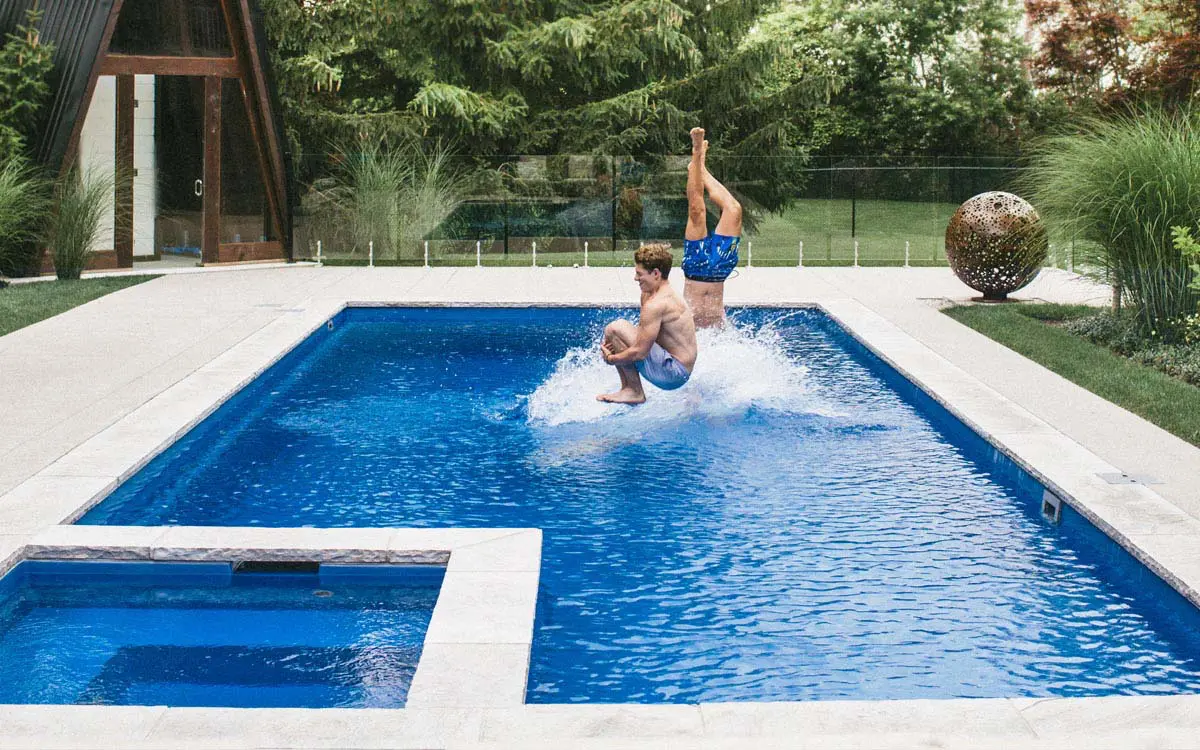
Salt Water Chlorinator: Perfectly Suited for Fiberglass Pools
Introduction
Salt water pools have grown in popularity, offering a more natural swimming experience with less maintenance and fewer chemicals. But did you know that fiberglass pools are particularly well-suited for salt water chlorinator systems?
In this article, we’ll explore why fiberglass pools and salt water chlorinators make the perfect pair. We’ll break down how salt water chlorination works, the benefits it offers, and why fiberglass outperforms other pool materials when paired with a salt chlorine generator.
What is a Salt Water Chlorinator?
This is a device that converts salt into chlorine through a process called electrolysis. Instead of manually adding chlorine to the pool, you simply add salt, which the salt chlorine generator then transforms into a steady supply of chlorine to keep the water clean and sanitized.
How It Works
- Salt Addition: A small amount of salt is added to the pool water.
- Electrolysis Process: The pool salt chlorinator passes an electric current through the saltwater, breaking down the salt (sodium chloride) into chlorine and other byproducts.
- Continuous Sanitation: The generated chlorine disinfects the water, eliminating bacteria and algae.
- Recycling Process: Once the chlorine completes its job, it converts back into salt, creating a continuous cycle.
This automated process ensures that your pool remains clean with minimal chemical handling, making pool maintenance easier and more efficient.
Benefits of Salt Water Chlorinators
Switching to a salt water chlorinator offers several advantages:
- Softer, Silkier Water: The water feels smoother on the skin and is less likely to cause irritation or dryness.
- Reduced Chemical Handling: No need to store or manually add large amounts of chlorine.
- Cost Efficiency: While the initial setup may be higher, long-term costs are lower due to reduced chemical purchases.
- Consistent Chlorine Levels: The automated system maintains stable chlorine levels, preventing over-chlorination and reducing the risk of harsh chemical imbalances.
Why Fiberglass Pools Are Ideal for Salt Water
Fiberglass pools are widely regarded as the best choice for salt water pool chlorinators. Here’s why:
- Non-Porous Surface: Unlike concrete, fiberglass does not absorb water, preventing algae buildup and reducing the demand for chlorine.
- Corrosion Resistance: Fiberglass is highly resistant to salt, meaning there’s no risk of deterioration, unlike metal components in vinyl pools.
- Durability: The smooth gel-coat finish of fiberglass pools stands up well to the effects of saltwater without requiring frequent resurfacing.
- Low Maintenance: With fewer chemical adjustments and cleaning needs, fiberglass pools offer a hassle-free experience.
Comparison with Concrete Pools
While concrete pools are durable, they are not the best match for salt water chlorinators. Here’s why:
- Porosity Issues: Concrete is porous, meaning it absorbs water and requires more chlorine to combat algae and bacteria.
- Surface Degradation: Saltwater can erode the plaster finish of concrete pools, leading to costly resurfacing.
- Higher Maintenance Costs: Frequent acid washing and chemical balancing add to long-term expenses.
Comparison with Vinyl Pools
Vinyl pools are another option, but they come with their own set of challenges when paired with pool salt chlorinators:
- Metal Components at Risk: Many vinyl pools have metal wall panels or coping, which can corrode over time due to salt exposure.
- Liner Vulnerability: The increased chlorine levels required for vinyl pools can cause premature liner degradation.
- Higher Replacement Costs: Vinyl liners typically need to be replaced every 7–10 years, adding to maintenance expenses.
Long-Term Cost Savings
Investing in a salt water pool chlorinator for your fiberglass pool can lead to significant savings over time:
- Lower Chemical Costs: Reduced need for chlorine tablets, shock treatments, and other chemicals.
- Minimal Repairs: Fiberglass pools don’t require resurfacing, unlike concrete pools.
- Energy Efficiency: Many modern salt chlorine generators are designed to operate efficiently, reducing electricity costs.
Impact on Pool Water Quality
One of the biggest perks of using a pool salt chlorinator is the noticeable improvement in water quality:
- Crystal-Clear Water: The continuous chlorine production prevents cloudiness and algae growth.
- Less Irritation: Say goodbye to red eyes, dry skin, and the strong chlorine smell.
- Balanced pH Levels: Saltwater pools tend to have more stable pH levels, reducing the need for frequent chemical adjustments.
Environmental Benefits
A salt chlorine generator isn’t just good for your pool—it’s also better for the environment:
- Fewer Harsh Chemicals: Reduces the need for synthetic chlorine, which can be harmful to the ecosystem.
- Lower Chemical Runoff: Less risk of chemical spills or overuse affecting surrounding plants and wildlife.
- Sustainable Water Treatment: The salt-to-chlorine conversion process is a closed-loop system, minimizing waste.
Ease of Maintenance
Maintaining a salt water chlorinator is significantly easier than managing a traditional chlorine pool:
- Automatic Chlorine Production: No need for frequent chlorine additions.
- Less Algae Growth: The continuous chlorine cycle keeps algae at bay.
- Fewer Cleaning Requirements: The non-porous surface of fiberglass pools makes them easier to clean.
Salt Concentration Misconceptions
Many people assume that salt water pools are as salty as the ocean, but this is far from the truth:
- Ocean Water vs. Pool Water: The ocean has a salt concentration of about 35,000 ppm, while saltwater pools only contain around 3,000–3,500 ppm.
- Barely Noticeable Taste: Most swimmers don’t even notice the salt content in a properly balanced pool.
- No Sticky Residue: Unlike seawater, saltwater pools leave your skin feeling smooth, not sticky.
Conclusion
When it comes to pairing a salt water chlorinator with the right pool, fiberglass stands out as the best choice. With its durability, low maintenance, and resistance to salt corrosion, a fiberglass pool provides the perfect foundation for a hassle-free and enjoyable swimming experience.
If you’re considering upgrading to a salt chlorine generator, or if you’re looking for a fiberglass pool that will stand the test of time, contact us today to learn more about your options.